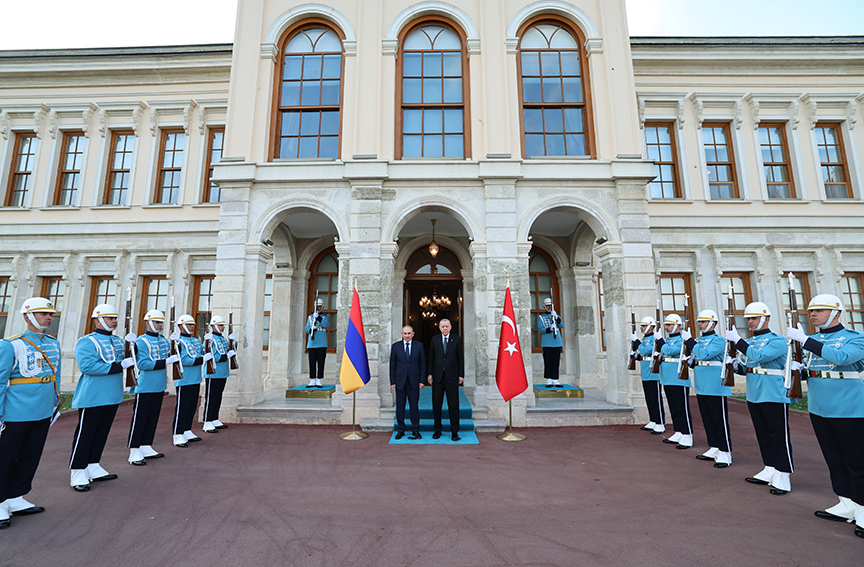
After the Second Karabakh War, a peace agreement between the states has long been awaited to ensure lasting peace and stability in the region. This agreement is of great importance for the stability and future of the region. We have explained the factors affecting and complicating the peace process in our previous articles.[1] The most important of these factors at this advanced stage is Azerbaijan's demand for amendments to the Armenian Constitution.
As is known, the Declaration of Independence, to which the Armenian Constitution refers, includes an article calling for the unification of Karabakh with Armenia.[2] Therefore, Azerbaijan is demanding the amendment of the Armenian Constitution as a condition for a peace agreement. The Armenian government has initiated efforts to amend the constitution and the date of amendment has been set for 2027.[3] Moreover, in his message on the anniversary of the Armenian Declaration of Independence, Pashinyan stated that the Declaration of Independence and the Constitution of the Republic of Armenia do not have the same legal significance.[4] Azerbaijan, on the other hand, considers the Armenian Constitution, which refers to the Declaration of Independence, as a threat to Azerbaijan's territorial integrity and states that constitutional amendment is one of the main conditions for a peace agreement.
Although Pashinyan made a statement that the Armenian Declaration of Independence and the Constitution are not the same, the protocol process between Türkiye and Armenia in 2009 shows that this is not the case. The Constitutional Court of Armenia ruled on the 2009 Protocols on the basis of the Constitution of Armenia and its integral part, the Declaration of Independence, rendering them inapplicable. In the end, the Armenian government officially announced that it canceled the Protocols. Thus, it is not realistic for the Türkiye-Armenia relations to move forward without taking into account the Armenian Constitution and the Declaration of Independence. This is also true for the Azerbaijan-Armenia relations.
The situation mentioned above shows that Azerbaijan is justified in its concerns regarding the Armenian Constitution. The Constitution defines the form of government of the state and is superior to all other legal rules and structures. Therefore, the presence of a reference in the most fundamental law of the state that does not recognize Azerbaijan's territorial integrity constitutes a direct threat to Azerbaijan's territory. And yet the postponement of the constitutional amendment to 2027 considerably overshadows the hopes and expectations for the signing of a peace agreement between Azerbaijan and Armenia in the near future.
*Picture: Agos
[1] Tuğçe Tecimer, “Obstacles To Peace Between Azerbaijan And Armenia”, AVİM, 26 July 2024, https://avim.org.tr/en/Yorum/OBSTACLES-TO-PEACE-BETWEEN-AZERBAIJAN-AND-ARMENIA.
[2] Declaration of Independence, The Government of Republic of Armenia, (Date of access: 10 September 2024) https://www.gov.am/en/independence/.
[3] “Armenian Constitutional Referendum ‘Planned For 2027’”, Azatutyun Radiokayan, 29 August 2024, https://www.azatutyun.am/a/33098341.html.
[4] “Անկախության հռչակագրի և ՀՀ Սահմանադրության բովանդակությունները նույնական չեն․ Փաշինյան”, Azatutyun, 23 August 2024, https://www.azatutyun.am/a/ankakhoutyan-hrchakagri-ev-hh-sahmanadrutyan-bovandakutyunnery-nuynakan-chen-pashinyan/33089529.html.
© 2009-2025 Center for Eurasian Studies (AVİM) All Rights Reserved
No comments yet.
-
 ANOTHER INSTANCE OF THE LEMKIN INSTITUTE'S DESTRUCTIVE CONDUCT
ANOTHER INSTANCE OF THE LEMKIN INSTITUTE'S DESTRUCTIVE CONDUCT
Tuğçe TECİMER 12.01.2026 -
 PASHINYAN’S EMPHASIS ON DEMOCRACY
PASHINYAN’S EMPHASIS ON DEMOCRACY
Tuğçe TECİMER 02.11.2023 -
 THE ISSUE OF MINE MAPS
THE ISSUE OF MINE MAPS
Tuğçe TECİMER 21.02.2024 -
 PASHINYAN'S WORKING VISIT: A STEP FORWARD IN THE TÜRKİYE-ARMENIA NORMALIZATION PROCESS
PASHINYAN'S WORKING VISIT: A STEP FORWARD IN THE TÜRKİYE-ARMENIA NORMALIZATION PROCESS
Tuğçe TECİMER 27.06.2025 -
 THE AZERBAIJAN-ARMENIA PEACE PROCESS AND THE IMPACTS OF LOBBIES
THE AZERBAIJAN-ARMENIA PEACE PROCESS AND THE IMPACTS OF LOBBIES
Tuğçe TECİMER 18.12.2024
-
MEETING WITH THE ARGENTINIAN MEDIA COMMITTEE
Turgut Kerem TUNCEL 25.05.2015 -
 RESOLUTIONS ON 1915 CAME ONE AFTER ANOTHER FROM U.S. SENATE
RESOLUTIONS ON 1915 CAME ONE AFTER ANOTHER FROM U.S. SENATE
AVİM 30.12.2019 -
THE CENTENNIAL OF THE BALKAN WARS
Alev KILIÇ 16.10.2012 -
 AN EXEMPLARY FIGURE IN DIPLOMACY AND HISTORY: IN MEMORY OF RETIRED AMBASSADOR BİLAL ŞİMŞİR
AN EXEMPLARY FIGURE IN DIPLOMACY AND HISTORY: IN MEMORY OF RETIRED AMBASSADOR BİLAL ŞİMŞİR
Teoman Ertuğrul TULUN 10.05.2024 -
 THE CZECH REPUBLIC PRESIDENT HAS SUCCUMBED TO THE WAVE OF POPULISM
THE CZECH REPUBLIC PRESIDENT HAS SUCCUMBED TO THE WAVE OF POPULISM
Hazel ÇAĞAN ELBİR 23.10.2017
-
25.01.2016
THE ARMENIAN QUESTION - BASIC KNOWLEDGE AND DOCUMENTATION -
12.06.2024
THE TRUTH WILL OUT -
27.03.2023
RADİKAL ERMENİ UNSURLARCA GERÇEKLEŞTİRİLEN MEZALİMLER VE VANDALİZM -
17.03.2023
PATRIOTISM PERVERTED -
23.02.2023
MEN ARE LIKE THAT -
03.02.2023
BAKÜ-TİFLİS-CEYHAN BORU HATTININ YAŞANAN TARİHİ -
16.12.2022
INTERNATIONAL SCHOLARS ON THE EVENTS OF 1915 -
07.12.2022
FAKE PHOTOS AND THE ARMENIAN PROPAGANDA -
07.12.2022
ERMENİ PROPAGANDASI VE SAHTE RESİMLER -
01.01.2022
A Letter From Japan - Strategically Mum: The Silence of the Armenians -
01.01.2022
Japonya'dan Bir Mektup - Stratejik Suskunluk: Ermenilerin Sessizliği -
03.06.2020
Anastas Mikoyan: Confessions of an Armenian Bolshevik -
08.04.2020
Sovyet Sonrası Ukrayna’da Devlet, Toplum ve Siyaset - Değişen Dinamikler, Dönüşen Kimlikler -
12.06.2018
Ermeni Sorunuyla İlgili İngiliz Belgeleri (1912-1923) - British Documents on Armenian Question (1912-1923) -
02.12.2016
Turkish-Russian Academics: A Historical Study on the Caucasus -
01.07.2016
Gürcistan'daki Müslüman Topluluklar: Azınlık Hakları, Kimlik, Siyaset -
10.03.2016
Armenian Diaspora: Diaspora, State and the Imagination of the Republic of Armenia -
24.01.2016
ERMENİ SORUNU - TEMEL BİLGİ VE BELGELER (2. BASKI)
-
AVİM Conference Hall 24.01.2023
CONFERENCE TITLED “HUNGARY’S PERSPECTIVES ON THE TURKIC WORLD"









